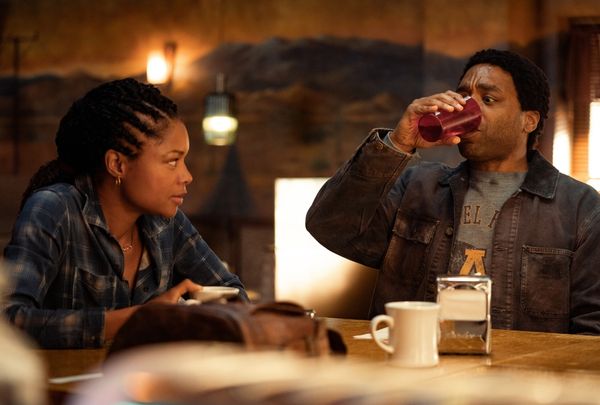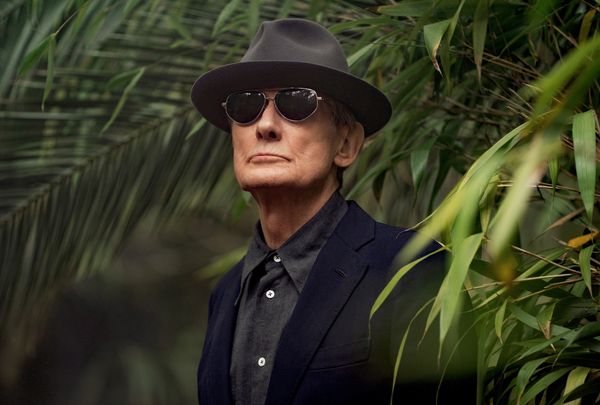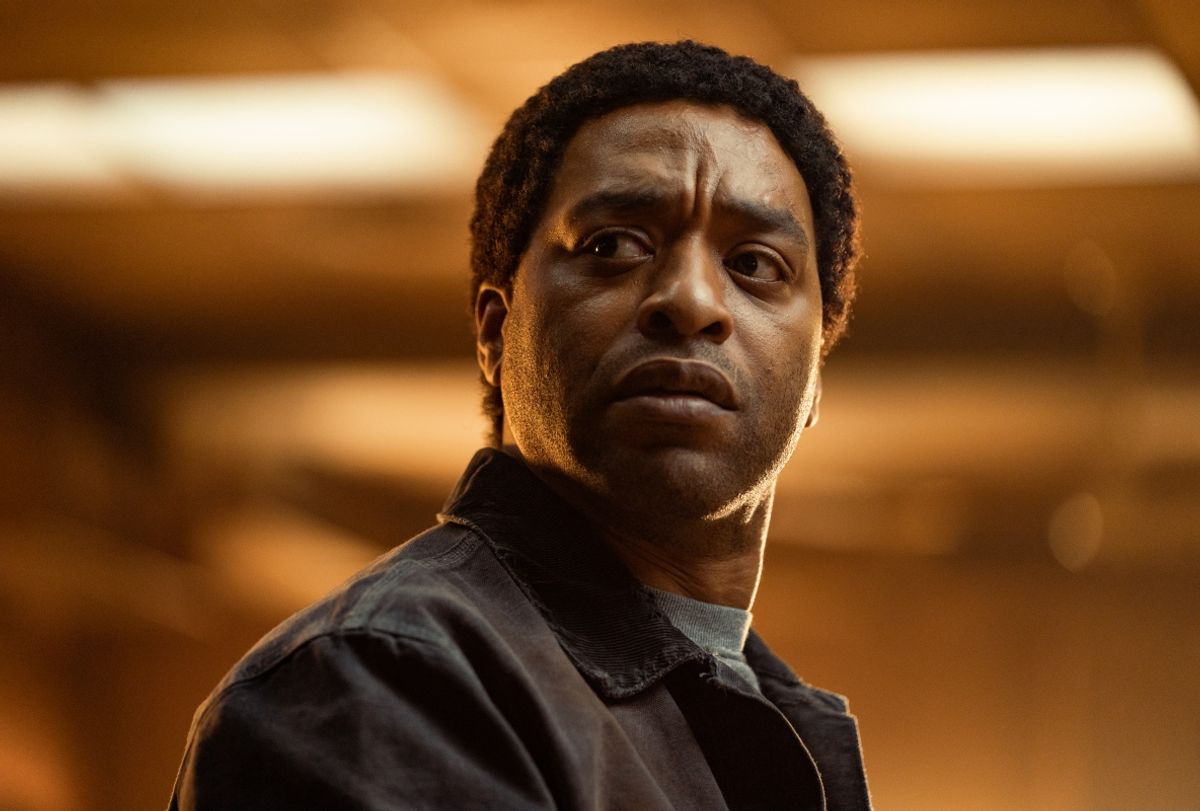In 1976 cinematic classic "The Man Who Fell to Earth," David Bowie's iconic alien Thomas Jerome Newton easily blends into humanity. He strolls into a small Kentucky town, lays down on a bench outside of an antiques store and waits for it to open. Once it does, he sells a gold wedding ring and goes on his way.
Forty-five years later another alien from Newton's home planet crash-lands on Earth, this time in New Mexico. But his entry is nowhere as smooth. Newton arrives fully clothed and dapper, while this alien, played by Chiwetel Ejiofor, stumbles out fully naked and desperately thirsty. It isn't long before he's Tased, arrested and beaten.
And while Newton speaks flawless, British-accented English, Ejiofor's interstellar traveler, who takes the name Faraday from a cop he encounters (Martha Plimpton, in a brief appearance), learns human languages as he goes, along with how to walk properly, how to emote, how to be move through this mean, foreign world that, like his own, is dying.
Faraday is anxious about time, fearing there isn't enough of it for his people or humanity. Watching the four episodes of Showtime's TV continuation of "The Man Who Fell to Earth," I wondered about that too.
RELATED: "There is no generic Africa": Chiwetel Ejiofor fell in love with Malawi for his directorial debut
"I am an immigrant, a refugee. To survive, I had to be reborn."
The series draws from Walter Tevis' 1963 novel and Nicolas Roeg's artistic film adaptation to expand the film's commentaries on the peril of materialism and alcoholism to emphasize its themes of environmental degradation and the immigrant's feeling of alienation, no pun intended.
But in 2022, the fantasy that Thomas Jerome Newton represented decades ago is our reality, embodied in polarizing figures like Elon Musk and Jeff Bezos – men who offer humankind convenience and distraction, promising wonders in exchange for obtaining the massive wealth he needs to build a spaceship to get the hell out of here. Faraday will become one of these figures, established in an opening scene showing him bewitching an auditorium full of believers with the promise of finally telling his story, TED Talk-style.
"I am an immigrant, a refugee. To survive, I had to be reborn," Faraday tells his rapt audience. Newton walked the same path, but the CIA nabbed him before he could board his spacecraft and return home. The company Newton built seemingly overnight, World Enterprises Corporation, still exists – and somewhere on Earth, so does he. in the guise of Bill Nighy).
That's a lot of ground to cover in 10 episodes, and the opening hours take their time to establish Faraday's identity, showcasing Ejiofor's astounding expressive dexterity. This is a luxury series co-creator Jenny Lumet and Alex Kurtzman have that Roeg did not have in Bowie, who later admitted he was playing a coked-up version of himself throughout the production.
Ejiofor in contrast believably evolves Faraday from a wide-eyed, mouth-breathing newborn to a toddler who learns to speak English, albeit haltingly, in a matter of hours and Farsi (presumably along with every other language ) within days, and who also vomits his way out of scrapes. It's an incredible performance bursting with tenderness, humor and the requisite level of oddity one would expect of a being thrust into an unfamiliar place.
It's an incredible performance bursting with tenderness, humor and the requisite level of oddity.
And his effort holds space in readiness for the other parts of the story to coalesce and figure themselves out before clicking into place – hence the concern about adequate time. The drama launches with a juggle of storylines; Faraday and Naomie Harris' underemployed scientific genius Justin Falls propel the main plot, but they're merely the vanguard.
Justin, a one-time shining star at M.I.T., ran into a career-halting obstacle when her attempts at cold fusion failed. When Faraday finds her she's barely getting by doing toxic clean-up work to support her daughter Molly (Annelle Olaleye) and elderly, sickly father Josiah (Clarke Peters), another former scientist whose career once held boundless promise. She believes her shot has passed . . . until Faraday convinces her she may be the only person in the world who can help him construct an energy generator that could save both his planet and ours.
 Naomie Harris and Chiwetel Ejiofor in "The Man Who Fell to Earth" (Aimee Spinks/SHOWTIME)
Naomie Harris and Chiwetel Ejiofor in "The Man Who Fell to Earth" (Aimee Spinks/SHOWTIME)
Before that can happen, he has to persaude her to believe him, and believe in her own abilities again, and getting to that point in the first two hours can verge on frustrating. But Ejiofor and Harris find their rhythm, assisted by the always magnificent Peters, and by the third episode they achieve liftoff.
It's impossible to fully appreciate the creative challenges Lumet and Kurtzman and their fellow showrunner John Hlavin are taking on. Any director coming after Roeg is asking for their work to be compared to his unearthly, alluring visual style; Kurtzman, who directs these opening episodes, chooses to pay tribute while applying his own signatures, recognizable to viewers of his "Star Trek" movies and "Fringe," which he co-created (and features its own take on Thomas Jerome Newton).
(And to answer an obvious question, you don't have to have seen the 1976 film to understand the series. But those who watch it before digging into this modern take will be rewarded by noticing details and roles first introduced there that reappear here.)
Want a daily wrap-up of all the news and commentary Salon has to offer? Subscribe to our morning newsletter, Crash Course.
Kurtzman leans upon TV's long history with aliens living among us to trust the audience's fondness for the medium's own version of weird; we've seen this story before in the form of "Roswell," "Alien Nation," various episodes of "The X-Files," not to mention countless beloved comedies. He uses auditory and visual swells that approximate a Lynchian weirdness, and combined with Ejiofor's rubbery performance and Harris' anxious static, it instantiates the dizziness of Faraday's quest for the viewer, along with his and Justin's loneliness.
This all happens before we meet the rest of the players, discover their stories and motivations – like we said, there are other people and plots wanting to either work with Faraday, exploit him or stop him, permanently.
Jimmi Simpson adds another creepy adversary to his repertoire as a psychologically volatile government agent enlisted by his mentor (Kate Mulgrew) to track down Faraday in order to find the frustratingly elusive Newton. The balance to Simpson's hair-trigger persona is Rob Delaney's Hatch Flood, the ousted brother of the woman currently in charge of World Enterprises, Edie Flood (Sonya Cassidy). Delaney and Cassidy are terrific as sibling rivals, with Delaney's Hatch taking the sad sack role as the wise loser everyone disregards.
 Bill Nighy in "The Man Who Fell to Earth" (Aimee Spinks/SHOWTIME)They introduce Faraday to a range of humanity, while Nighy, resurrecting Bowie's character as a disillusioned alcoholic who retains his serpentine flair nevertheless, offers his own experience as a warning about getting too close. He claims Newton in the same way the series owns its right to continue what Tevis and Roeg started, acknowledging how intimately the legendary artist was associated with the spaceman role while offering his own rock star poise as a counterpoint.
Bill Nighy in "The Man Who Fell to Earth" (Aimee Spinks/SHOWTIME)They introduce Faraday to a range of humanity, while Nighy, resurrecting Bowie's character as a disillusioned alcoholic who retains his serpentine flair nevertheless, offers his own experience as a warning about getting too close. He claims Newton in the same way the series owns its right to continue what Tevis and Roeg started, acknowledging how intimately the legendary artist was associated with the spaceman role while offering his own rock star poise as a counterpoint.
It is very clear that the makers of "The Man Who Fell to Earth" aren't trying to rewrite or outrun the film's legacy. They're simply picking up the thread and rocketing it forward to amplify its potency as a parable – several, actually, about our climate crisis, race, immigration and that science-fiction existential staple, what it means to be human. There's no way to know if this season will land without problems or if, indeed, the story has enough fuel to extend the journey beyond its presently allotted hours. But its confident performances are enough to make us want to see where this mission leads.
"The Man Who Fell to Earth" debuts at Sunday, April 24 at 10 p.m. on Showtime. Watch a trailer for it below, via YouTube.
More stories like this:



Shares